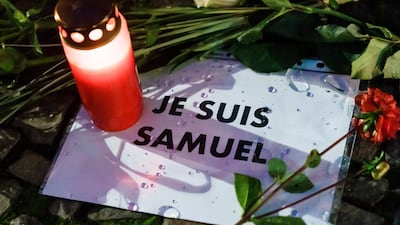In the past month, France has witnessed a wave of heinous terrorist attacks. On October 16, Samuel Paty, a schoolteacher, was beheaded by Abdullakh Anzorov, an 18-year-old extremist. It is alleged that the killer targeted Paty for showing offensive cartoons of Prophet Mohammed in class, as part of a lesson on freedom of speech.
Paty’s five-year-old son is now orphaned, and an entire nation traumatised, as France is forced to relive some of the worst moments in its recent history. In 2015, a series of co-ordinated attacks claimed by ISIS left 137 people dead in the heart of Paris.
The group attacked a concert hall and several other venues in the French capital at the same time. The carnage at the Bataclan Theatre, where 90 victims fell, shocked the world. Testimonies and video footage appeared of people hiding in cramped spaces for hours, taking refuge on the roof in the freezing cold or having to remain immobile under the bodies of their friends to escape slaughter. The attacks took place 11 months after the office of the satirical magazine Charlie Hebdo was stormed by Al Qaeda in the Arabian Peninsula, killing 12 people.
Families of the victims of terrorism deserve everyone’s support, regardless of political and religious views. The French have shown extraordinary solidarity with Paty’s loved ones, and many have honoured his memory in marches, protests and online with the hashtag “Je suis Samuel” (I am Samuel), the slogan used in the Charlie Hebdo attacks.
Inevitably, Paty's murder renewed the debate about the cartoons, first published over a decade ago in Charlie Hebdo.
The illustrations offend Muslims around the world as they are purposely drawn to cause offence and are insulting to the Prophet Mohammed. They specifically target that which Muslims around the world hold sacred, in addition to that it is considered blasphemous to draw religious figures.
The debate around the cartoons should have sparked a conversation about the importance of respecting all religions as well as human lives. Yet the controversy has spun out of control, fuelling toxic rhetoric that has inspired more terrorist attacks instead of fostering dialogue and clearing up misunderstandings. We must remember that there are close to six million Muslims, and more than 2,250 mosques, in France. From the Institute of the Arab World to the Louvre Museum, the history and cultures of the Arab and Muslim world are taught and respected in numerous institutions in France.
The past few weeks have witnessed a troubling lack of nuance and understanding. While there are undoubtedly reasons to call for more respect for religion and people’s belief systems, even more important is the need to call for the respect of human life. We should all be outraged that a woman aged 60 was beheaded in a church in Nice, and two others also killed. Following the gruesome murders, a far-right extremist attacked a man of North African descent in the town of Avignon.
These heinous crimes must stop now. Nothing justifies taking another person’s life. Those who claim to commit crimes in the name of religion are hypocritical. Extremist violence has been condemned by Islamic scholars and imams, and it goes against religious scriptures. For instance, in a hadith attributed to the Prophet Mohammed, he tells his followers that “a true believer is one with whom others feel secure”. Those words are the polar opposite of the violent ideology professed by those who claim to defend the Prophet Mohammed.
As France enters a second lockdown, many are left scared and confused after their lives have been changed both by a pandemic and a new wave of terrorist attacks. Compassionate people of all faiths and belief systems must support the people of France during these difficult times.


